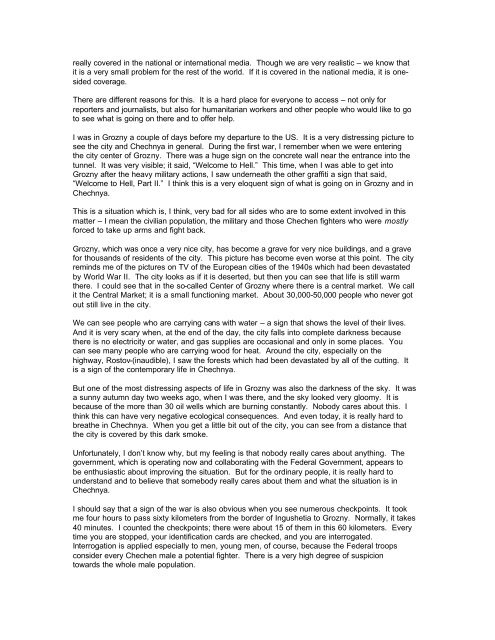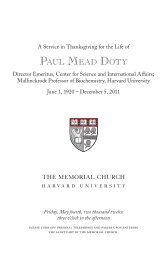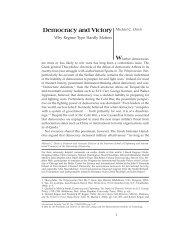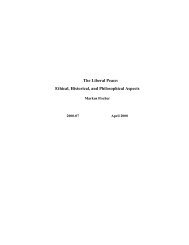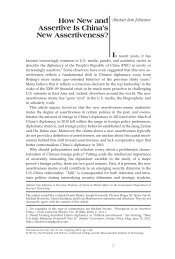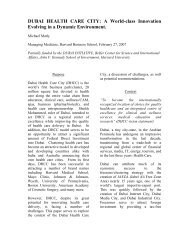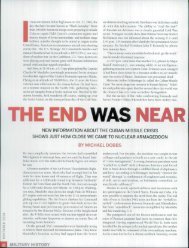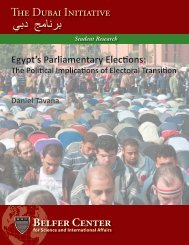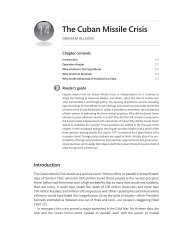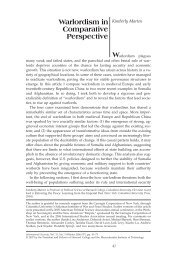Civil Society and Peace-building in the North and South Caucasus ...
Civil Society and Peace-building in the North and South Caucasus ...
Civil Society and Peace-building in the North and South Caucasus ...
Create successful ePaper yourself
Turn your PDF publications into a flip-book with our unique Google optimized e-Paper software.
eally covered <strong>in</strong> <strong>the</strong> national or <strong>in</strong>ternational media. Though we are very realistic – we know that<br />
it is a very small problem for <strong>the</strong> rest of <strong>the</strong> world. If it is covered <strong>in</strong> <strong>the</strong> national media, it is onesided<br />
coverage.<br />
There are different reasons for this. It is a hard place for everyone to access – not only for<br />
reporters <strong>and</strong> journalists, but also for humanitarian workers <strong>and</strong> o<strong>the</strong>r people who would like to go<br />
to see what is go<strong>in</strong>g on <strong>the</strong>re <strong>and</strong> to offer help.<br />
I was <strong>in</strong> Grozny a couple of days before my departure to <strong>the</strong> US. It is a very distress<strong>in</strong>g picture to<br />
see <strong>the</strong> city <strong>and</strong> Chechnya <strong>in</strong> general. Dur<strong>in</strong>g <strong>the</strong> first war, I remember when we were enter<strong>in</strong>g<br />
<strong>the</strong> city center of Grozny. There was a huge sign on <strong>the</strong> concrete wall near <strong>the</strong> entrance <strong>in</strong>to <strong>the</strong><br />
tunnel. It was very visible; it said, “Welcome to Hell.” This time, when I was able to get <strong>in</strong>to<br />
Grozny after <strong>the</strong> heavy military actions, I saw underneath <strong>the</strong> o<strong>the</strong>r graffiti a sign that said,<br />
“Welcome to Hell, Part II.” I th<strong>in</strong>k this is a very eloquent sign of what is go<strong>in</strong>g on <strong>in</strong> Grozny <strong>and</strong> <strong>in</strong><br />
Chechnya.<br />
This is a situation which is, I th<strong>in</strong>k, very bad for all sides who are to some extent <strong>in</strong>volved <strong>in</strong> this<br />
matter – I mean <strong>the</strong> civilian population, <strong>the</strong> military <strong>and</strong> those Chechen fighters who were mostly<br />
forced to take up arms <strong>and</strong> fight back.<br />
Grozny, which was once a very nice city, has become a grave for very nice <strong>build<strong>in</strong>g</strong>s, <strong>and</strong> a grave<br />
for thous<strong>and</strong>s of residents of <strong>the</strong> city. This picture has become even worse at this po<strong>in</strong>t. The city<br />
rem<strong>in</strong>ds me of <strong>the</strong> pictures on TV of <strong>the</strong> European cities of <strong>the</strong> 1940s which had been devastated<br />
by World War II. The city looks as if it is deserted, but <strong>the</strong>n you can see that life is still warm<br />
<strong>the</strong>re. I could see that <strong>in</strong> <strong>the</strong> so-called Center of Grozny where <strong>the</strong>re is a central market. We call<br />
it <strong>the</strong> Central Market; it is a small function<strong>in</strong>g market. About 30,000-50,000 people who never got<br />
out still live <strong>in</strong> <strong>the</strong> city.<br />
We can see people who are carry<strong>in</strong>g cans with water – a sign that shows <strong>the</strong> level of <strong>the</strong>ir lives.<br />
And it is very scary when, at <strong>the</strong> end of <strong>the</strong> day, <strong>the</strong> city falls <strong>in</strong>to complete darkness because<br />
<strong>the</strong>re is no electricity or water, <strong>and</strong> gas supplies are occasional <strong>and</strong> only <strong>in</strong> some places. You<br />
can see many people who are carry<strong>in</strong>g wood for heat. Around <strong>the</strong> city, especially on <strong>the</strong><br />
highway, Rostov-(<strong>in</strong>audible), I saw <strong>the</strong> forests which had been devastated by all of <strong>the</strong> cutt<strong>in</strong>g. It<br />
is a sign of <strong>the</strong> contemporary life <strong>in</strong> Chechnya.<br />
But one of <strong>the</strong> most distress<strong>in</strong>g aspects of life <strong>in</strong> Grozny was also <strong>the</strong> darkness of <strong>the</strong> sky. It was<br />
a sunny autumn day two weeks ago, when I was <strong>the</strong>re, <strong>and</strong> <strong>the</strong> sky looked very gloomy. It is<br />
because of <strong>the</strong> more than 30 oil wells which are burn<strong>in</strong>g constantly. Nobody cares about this. I<br />
th<strong>in</strong>k this can have very negative ecological consequences. And even today, it is really hard to<br />
brea<strong>the</strong> <strong>in</strong> Chechnya. When you get a little bit out of <strong>the</strong> city, you can see from a distance that<br />
<strong>the</strong> city is covered by this dark smoke.<br />
Unfortunately, I don’t know why, but my feel<strong>in</strong>g is that nobody really cares about anyth<strong>in</strong>g. The<br />
government, which is operat<strong>in</strong>g now <strong>and</strong> collaborat<strong>in</strong>g with <strong>the</strong> Federal Government, appears to<br />
be enthusiastic about improv<strong>in</strong>g <strong>the</strong> situation. But for <strong>the</strong> ord<strong>in</strong>ary people, it is really hard to<br />
underst<strong>and</strong> <strong>and</strong> to believe that somebody really cares about <strong>the</strong>m <strong>and</strong> what <strong>the</strong> situation is <strong>in</strong><br />
Chechnya.<br />
I should say that a sign of <strong>the</strong> war is also obvious when you see numerous checkpo<strong>in</strong>ts. It took<br />
me four hours to pass sixty kilometers from <strong>the</strong> border of Ingushetia to Grozny. Normally, it takes<br />
40 m<strong>in</strong>utes. I counted <strong>the</strong> checkpo<strong>in</strong>ts; <strong>the</strong>re were about 15 of <strong>the</strong>m <strong>in</strong> this 60 kilometers. Every<br />
time you are stopped, your identification cards are checked, <strong>and</strong> you are <strong>in</strong>terrogated.<br />
Interrogation is applied especially to men, young men, of course, because <strong>the</strong> Federal troops<br />
consider every Chechen male a potential fighter. There is a very high degree of suspicion<br />
towards <strong>the</strong> whole male population.


